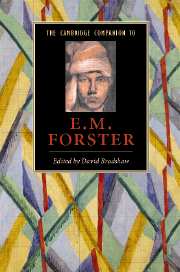Book contents
- Frontmatter
- Introduction
- 1 Forster’s life and life-writing
- 2 Bloomsbury and other values
- 3 Forster and England
- 4 Hellenism and the lure of Italy
- 5 Forster and the short story
- 6 Forster and the novel
- 7 Forsterian sexuality
- 8 Forster and women
- 9 A Room with a View
- 10 Howards End
- 11 Maurice
- 12 A Passage to India
- 13 Forster and modernism
- 14 Forster as literary critic
- 15 Filmed Forster
- 16 Postcolonial Forster
- Further reading
- Index
- Series List
2 - Bloomsbury and other values
Published online by Cambridge University Press: 28 September 2007
- Frontmatter
- Introduction
- 1 Forster’s life and life-writing
- 2 Bloomsbury and other values
- 3 Forster and England
- 4 Hellenism and the lure of Italy
- 5 Forster and the short story
- 6 Forster and the novel
- 7 Forsterian sexuality
- 8 Forster and women
- 9 A Room with a View
- 10 Howards End
- 11 Maurice
- 12 A Passage to India
- 13 Forster and modernism
- 14 Forster as literary critic
- 15 Filmed Forster
- 16 Postcolonial Forster
- Further reading
- Index
- Series List
Summary
Reputation
I am so saturated in the writing . . . of E. M. Forster that I find it hard to look on either the works or the author behind them objectively.
'the effect of knowing Forster was that he became a kind of supplementary conscience tacked on to my own.'
Comments such as these suggest how, for some of Forster's admirers, his popularity and the widespread view of him as an avuncular, yet morally provocative 'grand old man of letters' have made it almost impossible for them to respond dispassionately to his work and, indeed, to separate the man from his writing. One of the main reasons for this, for the fact that Forster's status as a maker of literature is so closely intertwined with his broader cultural currency, is that his work has been seen as a repository of value. It is not a coincidence that the rather old-fashioned word 'sage' has often been used to describe him: he was 'the great liberal sage of the interwar and postwar periods'. For his admirers, he embodied qualities that seemed especially desirable to those who had been through one or even two world wars: a firmly secular wisdom, anti-collectivist, rational, wry, stoical and wistful, saddened (but not overwhelmed) by the inevitability of compromise and the failure of ideals, not lacking in conviction, but refusing to be chauvinist.
- Type
- Chapter
- Information
- The Cambridge Companion to E. M. Forster , pp. 32 - 46Publisher: Cambridge University PressPrint publication year: 2007
- 2
- Cited by

